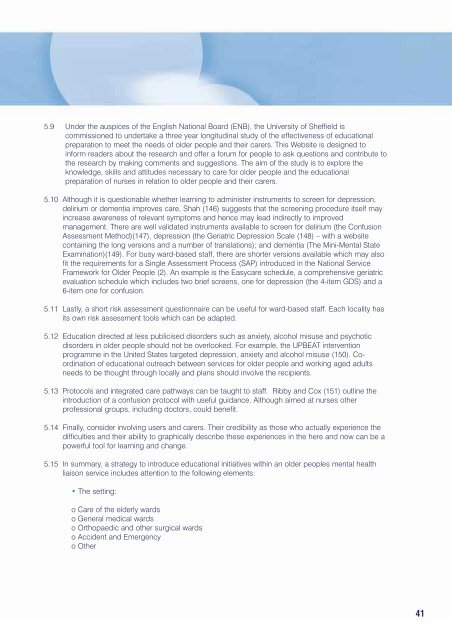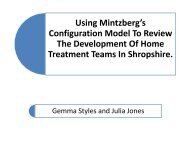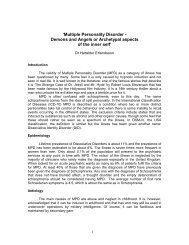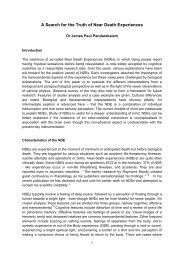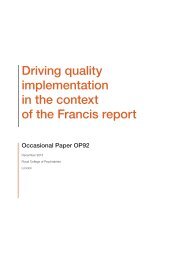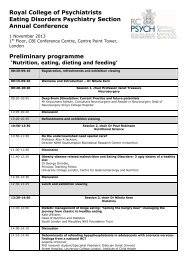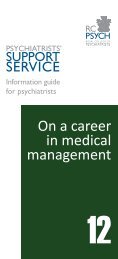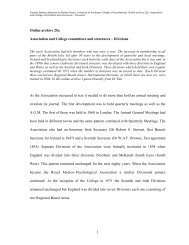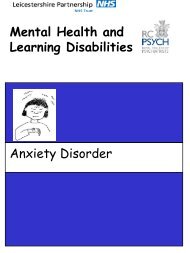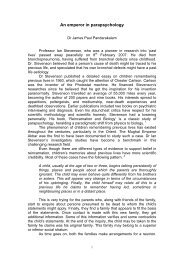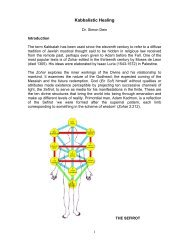Who Cares Wins - Royal College of Psychiatrists
Who Cares Wins - Royal College of Psychiatrists
Who Cares Wins - Royal College of Psychiatrists
You also want an ePaper? Increase the reach of your titles
YUMPU automatically turns print PDFs into web optimized ePapers that Google loves.
5.9 Under the auspices <strong>of</strong> the English National Board (ENB), the University <strong>of</strong> Sheffield is<br />
commissioned to undertake a three year longitudinal study <strong>of</strong> the effectiveness <strong>of</strong> educational<br />
preparation to meet the needs <strong>of</strong> older people and their carers. This Website is designed to<br />
inform readers about the research and <strong>of</strong>fer a forum for people to ask questions and contribute to<br />
the research by making comments and suggestions. The aim <strong>of</strong> the study is to explore the<br />
knowledge, skills and attitudes necessary to care for older people and the educational<br />
preparation <strong>of</strong> nurses in relation to older people and their carers.<br />
5.10 Although it is questionable whether learning to administer instruments to screen for depression,<br />
delirium or dementia improves care, Shah (146) suggests that the screening procedure itself may<br />
increase awareness <strong>of</strong> relevant symptoms and hence may lead indirectly to improved<br />
management. There are well validated instruments available to screen for delirium (the Confusion<br />
Assessment Method)(147), depression (the Geriatric Depression Scale (148) – with a website<br />
containing the long versions and a number <strong>of</strong> translations); and dementia (The Mini-Mental State<br />
Examination)(149). For busy ward-based staff, there are shorter versions available which may also<br />
fit the requirements for a Single Assessment Process (SAP) introduced in the National Service<br />
Framework for Older People (2). An example is the Easycare schedule, a comprehensive geriatric<br />
evaluation schedule which includes two brief screens, one for depression (the 4-item GDS) and a<br />
6-item one for confusion.<br />
5.11 Lastly, a short risk assessment questionnaire can be useful for ward-based staff. Each locality has<br />
its own risk assessment tools which can be adapted.<br />
5.12 Education directed at less publicised disorders such as anxiety, alcohol misuse and psychotic<br />
disorders in older people should not be overlooked. For example, the UPBEAT intervention<br />
programme in the United States targeted depression, anxiety and alcohol misuse (150). Coordination<br />
<strong>of</strong> educational outreach between services for older people and working aged adults<br />
needs to be thought through locally and plans should involve the recipients.<br />
5.13 Protocols and integrated care pathways can be taught to staff. Ribby and Cox (151) outline the<br />
introduction <strong>of</strong> a confusion protocol with useful guidance. Although aimed at nurses other<br />
pr<strong>of</strong>essional groups, including doctors, could benefit.<br />
5.14 Finally, consider involving users and carers. Their credibility as those who actually experience the<br />
difficulties and their ability to graphically describe these experiences in the here and now can be a<br />
powerful tool for learning and change.<br />
5.15 In summary, a strategy to introduce educational initiatives within an older peoples mental health<br />
liaison service includes attention to the following elements:<br />
• The setting:<br />
o Care <strong>of</strong> the elderly wards<br />
o General medical wards<br />
o Orthopaedic and other surgical wards<br />
o Accident and Emergency<br />
o Other<br />
41


